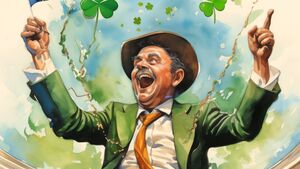Ireland cares too much for the opinions of others

The tale spun before tourists and in bars proclaims us a people ever ready to rise against oppression, defiant icons of courage against the empire's overweening ambition. The more profound truth about us Irish reveals a more conflicted strain.
Last week, sipping a morning coffee in a local café, I unfolded the daily newspaper with unease. I read headlines of gardaí in 24-hour surveillance guarding the national treasure that is our rotating Taoiseach. More news threatening the manicured image Bord Failte cultivated with years of state funding, and successfully. As an Irishman born in the 1960s, I feel an increasingly painful nostalgia for the Ireland of my childhood, a place of genial warmth where trust between people had not yet eroded. Of course, the old days were no idyll, but as Ireland hurtles towards slick modernity, an integral fibre of our national character strains under the momentum.
I came of age when this country was still shaking off the dust of distorted clerical domination. The ecclesiastical grip on society had long lost sight of its grace-filled roots, but once the corruption boil was lanced, the flood swept away perhaps too much of the familiar landscape. An entire system of moral authority collapsed, leaving the next generation adrift between the old certainties we scorned and the new era of unexamined ambition dawning on the horizon as the Celtic Tiger awoke.
Caught in that interstitial moment, my friends and I retained an appreciation for the uncalculating kindness that underpinned Irish life. Neighbours knew and aided each other as a matter of course. Doors lay unlocked, paths ungated. The warmth of human interaction, not possessions or status, gave daily life its savour. Of course, we welcomed the economic boom that soon came, the money and opportunities. But only some realised the cost as Ireland reinvented itself as a modern nation proud to take its place on the global stage.
Somewhere along the way, the unassuming mentality that still lingered in my youth got subsumed under world-class aspirations. The relaxed pace of life accelerated. Personal ambition replaced communal welfare as a motivating force. Always a people who loved words and stories, we Irish became enamoured of marketing slogans and images; this replaced reality instead of describing it. The warmth remained at some level – that essential Hibernian enjoyment of talk and lively company ingrained too deep to die. But now, it serves more as a spice to stimulate commerce than a balm to strengthen the community. We have lost the bliss of abandoned blarney.
But the well-publicised exuberance of Irish chat and humour concealed a vein of reticence running through our character. Perhaps some echo of colonial repression lingered even post-independence, or the natural introversion of islanders shaped our genetic code. Whatever the reason, we tended to play our cards close to our chests, keep private anguish damped down beneath witty repartee. This habit likely enabled the radical shift in public attitudes my generation witnessed. The same stoic reflex that once weathered foreign dictates now accepted revised dogma from newly enthroned arbiters of secular morality. And they have proven to have feet of clay.
The past quarter century has seen Ireland embrace a series of momentous social changes with astonishing speed. It seemed that the Church's reflection in the law and social mores dissolved overnight. Long sacred elements of how this country understood itself now lay dismissed as embarrassing anachronisms – no wonder older generations stood stunned at all they no longer recognised. But more was yet to come. With each referendum, familiar foundations were defined as dangerous bigotries needing uprooting in the name of progress. Historic Irish penchants for rebellion and even iconoclasm fed the momentum; their heat focused on inward targets when external oppressors no longer presented themselves.
Predictably, much of this came cloaked as the inevitable work of modernisation – an end to parochial perspectives and entry as equal partners into the 21st-century global order. EU membership brought countdowns to when Ireland would graduate into an era of enlightened maturity, shedding provincial trammels. Chafing under the legacy of colonised inferiority, we celebrated taking our place among world leaders who validated our new progressive laws. The endorsement of outsiders somehow mattered more than innate integrity or continuity with all that we, as a people, once understood ourselves to be.
The underside of this hunger for global approval lay in one fact we are slow to recognise: Ireland had always cared too much for the opinions of others. Much of our lauded progressivism is rooted in a craven need for validation, never quite believing ourselves deserving of our newfound liberality and unprecedented prosperity. Where our larger neighbour Britain had spent centuries imposing its will on half the planet with imperial command, we Irish occupied the opposite pole – internalising the disdain of colonial subjugation and absorbing oppressor values to assuage a secret shame incurred by the failure to ultimately drive armies from our land. That legacy etched itself too deep not to warp future growth. We resurrected the famine years as a token of both colonial oppression and national failure.
We Irish nurture a persistent mythos around our storied history of rebellion against foreign domination. The tale spun before tourists and in bars proclaims us a people ever ready to rise against oppression, defiant icons of courage against the empire's overweening ambition. The mythic tapestry of unbroken resistance glosses over less noble accommodations with power. The more profound truth about us Irish reveals a more conflicted strain – rarely true rebels at heart so much as scorned lovers aching to gain approval from those who wounded our pride.
Beneath lyrical ballads glorifying every past rising, Irish history records long eras of relative docility under leaders imposed from across the sea. And when independence finally tore that banner down, an anxious gravity towards order quickly quelled the fervour. Be it under the new clerical state Éamon de Valera erected to approve Church dominion or the latest cadre overturning that order to impose a revised doctrine, we Irish prove loathe to bite the hand that leads. This is not to question the sincerity behind their guidance but to note a sheeplike tendency when confronted with strongly projected certainty.
This instinct to defer to those expressing certainty reflects an Irish inclination of spirit – we genuflect before anyone wielding a self-assurance we lack in ourselves. Rather than thoughtful philosophical rebellion, our dramatic rejection more closely resembles a petulant outburst. The anarchy in Dublin's streets following the child stabbings was little more than a dangerous tantrum, not the manifestation of any cohesive, far-right ideology. The post-riot government rhetoric is an opportunistic, self-serving mirage, full of smokescreens. To label these riots an expression of the far right is to credit them with a political cohesion utterly alien to their wanton thuggery. However, it serves the fiction of a sinister far right ready to storm imagined ramparts protecting a creeping tyranny masquerading as liberty.
The result is that today's Ireland presents a Janus face to the world. One visage captures everything audiences expect from comic tales of Irish excess and unpredictable 'rebellion' against constraints. This remains a vital currency in Ireland's appeal to tourists seeking a brief escape from their more humdrum lives. But turn the coin, and you find a desperate desire for global plaudits – the world's great societies approving our modernised transformation. If we dare mention our Christianity, it's as a cold statistic, not an affirmation of intergenerational faith that shaped our culture, architecture and resurgent nationalism.
Politicians plead imperatives beyond their control or ability to challenge. Our incumbent political elites have more in common with Brussels than Belmullet. So internal debates get framed to suit external metrics, policies crafted to meet supposed economic necessity or standards set by bodies lightyears away, both physically and culturally. Judges quote UN committees and European courts rather than legal tradition reflecting a once cherished constitution Is this rendered inevitable by forces of global capitalism and digital connectivity binding all societies into common rhythms? For the sake of sanity, I believe some essential continuity with the past can be woven into whatever we now become. But restoring the frayed social contract of mutual interdependence, rather than chasing markers of achievement enforced by political elites, requires an Irish-centric leadership currently lacking from our jaded governing class.
In the next generation, can we look for continuity with every past age who defended the character of this land? I can only hope they recognise the treasure they inherit and retain it long enough to pass on when their time comes to guide Ireland's course between tradition and all that will change. What is a people if they lose sight of who they are? Ireland may don any costume the world demands, but let's cultivate the national flavours still thriving underneath before we become bland and tasteless.





